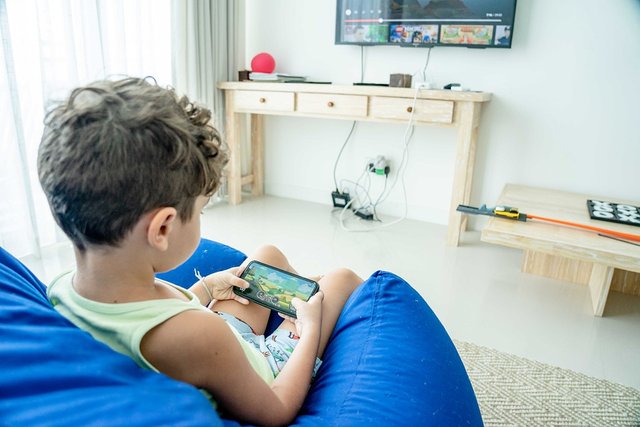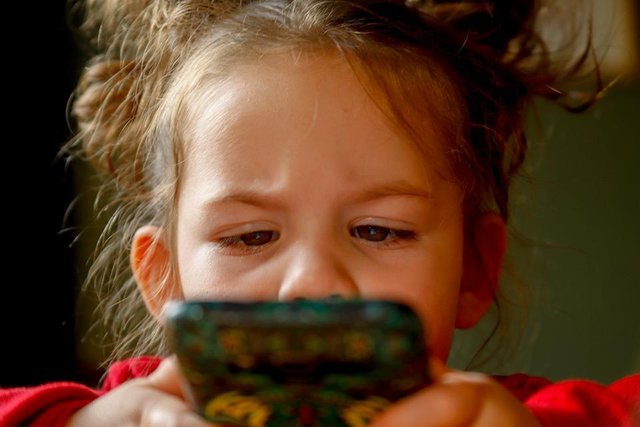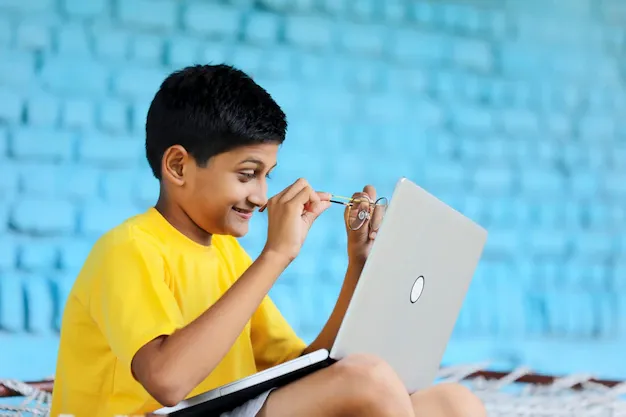""Steemit Engagement Challenge S3-W2: Impacts of Technology in kids lives by @meethussnain.""
Introduction
It is a great honor for me that L am writing in engagement challenge contest in the Steem kids Community. It is my second step in this great community . Second week challenging topic Title "Steemit Engagement Challenge S3-W2: Impacts of Technology in kids lives. It is very fabulous topic and I have great interest in it .
 Source (https://www.freepik.com/free-photo/little-girl-participating-online-classes-home_16392830.htm)
Source (https://www.freepik.com/free-photo/little-girl-participating-online-classes-home_16392830.htm)
Psychologists from around the world are absolutely unanimous that digital technologies have a significant impact on the child. The impact is on the emotional, physical, social spheres, as modern children can no longer imagine life without electronic devices.
This influence, of course, is not always negative, because digital technologies also contribute to the development of the child, allowing him to receive a huge flow of useful information.
Nowadays, TV and computers have firmly entered the lives of kids. The TV screen replaces grandmother's tales, mother's lullabies, conversations with the father... the screen becomes the child's main educator.
 source (https://www.dreamstime.com/stock-photo-little-girl-looks-mobile-phone-asian-image54036743)
source (https://www.dreamstime.com/stock-photo-little-girl-looks-mobile-phone-asian-image54036743)
Today's families are different. The impact of technology on the 21st century family is breaking its foundation and causing the disintegration of core values that have long been a theme that has held families together. Juggling school, work, home and community life, parents now rely heavily on communication, information and transportation technology to make their lives faster and more efficient.
Entertainment technologies (TV, Internet, video games, iPads, cell phones) have developed so rapidly that families have hardly noticed significant impact and changes in their family structure and lifestyle. A 2010 Kaiser Foundation study found that young children use an average of 7.5 hours of entertainment technology per day, 75 percent of these children have televisions in their bedrooms, and 50 percent of homes in North America have a television set throughout the day. The conversation in the dining room left, replaced the "big screen" and took it out.
 source(https://us.norton.com/internetsecurity-kids-safety-mobile-phone-safety-for-kids.html)
source(https://us.norton.com/internetsecurity-kids-safety-mobile-phone-safety-for-kids.html)
Nowadays, children use technology for most of their play, which makes it extremely difficult for their creativity and imagination, as well as limiting their challenges to achieve optimal sensory and motor development. Sedentary bodies bombarded with chaotic sensory stimulation lead to delays in reaching a child's developmental life stages, with a subsequent negative impact on the basic basic skills for achieving literacy. Tough cables for high speed, today's young people enter school struggling with the self-regulation and attention skills needed for learning end up becoming significant behavior management challenges for teachers in the classroom.
So what is the impact of technology on the developing child?
The development of children's sensory, motor, and attachment systems has not biologically evolved to accommodate this sedentary but frantic and chaotic nature of modern technology. The impact of rapidly advancing technology on the developing child has resulted in an increase in physical, psychological and behavioral disorders that health and education systems are only just beginning to detect, much less understand. Obesity and diabetes are now national epidemics in both Canada and the US, causally linked to technology overload. Diagnosis ADHD, autism, impaired coordination, developmental delays, slurred speech, learning difficulties, sensory processing disorder, anxiety, Depression and sleep disorders are linked to the overuse of technology and are growing at an alarming rate. A closer look at the critical factors for achieving milestones and the subsequent impact of technology on these factors would help parents, teachers and health professionals better understand the complexity of this problem and help create effective strategies to reduce technology use.
The four important factors needed to achieve healthy development in a child are movement, touch, human connection, and exposure to nature. These types of sensory materials provide normal postural development, bilateral coordination, optimal states of arousal, and self-regulation required to achieve the basic skills for eventual school entry. Young children require 2-3 hours per day of active rough and drumming to achieve adequate sensory stimulation of their vestibular, proprioceptive, and tactile systems. The tactile stimulation received from touch, hug and play is critical to the development of practice or planned movements. Touch also activates the parasympathetic systems, which reduce cortisol, adrenaline, and anxiety.
 source (https://www.learningliftoff.com/how-tech-and-mobile-devices-encourage-independent-learning-in-kids)
source (https://www.learningliftoff.com/how-tech-and-mobile-devices-encourage-independent-learning-in-kids)
Further analysis of the impact of technology on the developing child indicates that while the vestibular, proprioceptive, tactile and attachment systems are being stimulated, the visual and auditory sensory systems are in "overload". This sensory imbalance creates huge problems in overall neurological development as the brain's anatomy, chemistry and pathways become permanently altered and weakened. Young children who are abused through television and video games are in a high state of adrenaline and stress because the body does not know that what they are watching is not real. Children who abuse technology report constant body sensations in general of "shaking", increased breathing and heart rate, and a general state of "anxiety".
Gaming and children
It is important to bring parents, teachers, and therapists together to help society “wake up” and see how disruptive impact technologies have on not only our child’s physical, psychological, and behavioral health, but also their ability to learn and maintain personal and family relationships. While technology is a train that will constantly move forward, knowledge of its detrimental effects and actions to balance the use of technology with critical developmental factors will be directed towards sustaining our children. While no one can argue about the benefits of advanced technology in today's world, being plugged into these devices could lead to disconnection from what society should value most, children. Instead of hugging, playing, rough housing and talking to children,
Negative impact of technology on children.
We are used to living with the idea that high technologies are only good, so we are happy to welcome more and more new devices. Nevertheless, there is an assertion in society that modern technology is not the best friend for young children.
In the 90s, children were brought up by television, and even more advanced technological solutions are fighting for the attention of modern kids and schoolchildren. Social networks , video games, messengers and smartphones - all of them, to one degree or another, influence the development of the younger generation.
 source (https://pixabay.com/photos/baby-toddler-phone-smartphone-cute-5871185/)
source (https://pixabay.com/photos/baby-toddler-phone-smartphone-cute-5871185/)
Senior schoolchildren and students themselves are able to prioritize and control their screen time, which cannot be said about preschoolers: they still do not know anything about the importance of the rational use of gadgets (they are not familiar with such words). But they eagerly copy the behavior of their parents, reach for smartphones and tablets, do not hesitate to ask for expensive devices as a gift.
On the one hand, a kid who enthusiastically plays by himself (even on a tablet) is the dream of any parent. But on the other hand, involuntarily, the thought will slip through: is such close communication with technology useful at a young age? And if not, how serious will the consequences be?
GADGETS, HIGH TECHNOLOGY AND CHILDREN
Children acquire the first skills in using personal electronics very early. And we must admit that these skills are essential in the modern world. Without them, it will not be possible to prepare homework, find something to your liking, and spend your free time usefully.
Parents whose child has mastered a smartphone or computer can finally afford to calmly drink a cup of coffee while their child is tormented by endless questions from the voice assistant or doing something in Minecraft.
Sticking a phone to a bored toddler is not the best way to find peace. But do not rush to scold yourself: so many adults do this. And if you do this only from time to time, a bad habit will not have time to form. We can talk about real problems if the child has unlimited access to gadgets and the Internet, and close people do not seek to diversify his life with other activities. In this situation, the child easily acquires a bunch of problems with health, psyche and communication. Let's talk about them.
Internet
The human brain has amazing capabilities. It holds a million gigabytes of data! But the world around us is still much wider. News, videos, music and other sources of information bombard our brain around the clock, forcing it to reorganize itself to search for the most interesting as soon as possible. Headlines flash before my eyes, tracks in the playlist switch, not even playing to the middle - it has become unprofitable to spend time studying everything in a row. From such a lifestyle, the period of concentration of attention in a person was shortened. To keep the audience, online content has also become shorter and easier to understand.
Rapid content change is also bad. Social networks, TVs and the Internet force us to instantly switch between different, sometimes unrelated events. A child's brain, which is at a rapid stage of development, is forced to multitask to such an extent that it can sometimes be difficult for him to concentrate on one thought or activity. Such a child is in a state of chronic overload. He is not able to calmly sit through 45 minutes of a lesson, read two pages of text, or talk coherently about how the day went. His thinking is clip-like: he perceives only vivid fragmentary images.
Back in 2002, the medical journal Pediatrics conducted a study on the influence of TV and video games on children's behavior. More than 1,300 Americans aged 6 to 12 took part in it. With an average screen time of over 4 hours, most of them experienced problems with concentration. A 2007 follow-up study confirmed these findings and suggested that the effect persists in the long term.
 source (https://pixabay.com/photos/boy-smartphone-mobile-technology-7258367/)
source (https://pixabay.com/photos/boy-smartphone-mobile-technology-7258367/)
HEALTH PROBLEMS
Most often, set-top boxes, televisions and telephones are scolded for the fact that they provoke a “bouquet” of diseases. The root of health problems lies in the lack of physical activity: children spend most of the day in a sitting position. Many at the same time gobble up packs of chips, candy and other unhealthy foods, which also leads to weight gain.
Childhood obesity is a serious, but far from the only problem that gadgets are to blame for. There is also tendinitis of the thumb (inflammation of the tendon) due to video games or prolonged typing; eye strain due to prolonged viewing of bright screens at close range;
Poor posture due to incorrect body position;
Hearing loss due to excessive use of headphones at high volume;
Pain in the neck due to the constant tilt of the head forward;
Headache.
DETERIORATION IN THE QUALITY OF SLEEP
In the modern world, children have round-the-clock access to media content. They can easily spend the night texting or watching TV series instead of sleeping. And this is bad, because for normal development, children need much more sleep than adults.
A study by the National Institute of Child Health and Human Development (USA) showed that the use of electronic media before bedtime is bad for the quality of children's sleep. This conclusion is confirmed by the medical journal JAMA Pediatrics. Not getting enough sleep at night, the child suffers from an inability to concentrate all day. Despite constant drowsiness, it becomes more difficult for him to fall asleep, and sleep brings less rest. It turns out a vicious circle.
 source(https://pixabay.com/photos/baby-girl-kid-children-girl-child-5003421/)
source(https://pixabay.com/photos/baby-girl-kid-children-girl-child-5003421/)
BEHAVIOR AND EMOTIONAL PROBLEMS
Today it has become fashionable to blame social networks for all the sins of young people: they say, if they were banned, the nation would become healthier. Not so simple. There are benefits from them, but also a lot of harm.
Social media exacerbates self-doubt. Children tend to copy the behavior of those who impress them - online friends, movie heroes, popular bloggers. Later, they face disappointment when in real life they can’t repeat what they see on the Internet: others didn’t appreciate the joke, the trick didn’t work, etc. If the child is not too self-confident and led by nature, his self-esteem suffers.
The statistics are terrible. In anonymous surveys, every third teenager admits to having been or is a victim of cyber bullying. A study published in the journal SAGE found that children who use social media on a regular basis are more likely to develop mental health problems. Another study published in the International Journal of Child Health and Human Development found that out of 1,500 children who use the Internet for more than 3 hours a day, 30% are diagnosed with depression.
WEAK SOCIAL SKILLS
Constant communication through electronic devices inhibits the development of skills that are acquired during personal interaction between people.
Through the Internet, children easily adopt aggressive behavior, get used to intimidation and rudeness, and begin to perceive such relationships as the norm. A study published in the journal BMC Public Health shows that the more time children spend in front of screens, the weaker their real communication skills are.
EARLY EXPOSURE TO ADULT CONTENT AND SAFETY ISSUES
Perhaps the worst nightmare of parents is that children will stumble upon explicit materials on the Internet. Yes, sooner or later it will happen if access to the network and gadgets is not limited in any way. Sites with 18+ content do not have serious mechanisms for checking the age of users. This means that any child can visit such a site and study all its sections.
This is just one problem. There are a lot of stories when cybercriminals manipulated children through the Internet, forcing them to send candid selfies . These same people may use your children as a source of information about family resources and personal details.
How to prevent all these troubles?
f you consider yourself a responsible parent, you probably already understand that high technology in the lives of children must be limited. At the same time, as a reasonable person, you must understand that strict bans will not give any effect, and technology must be present in the life of everyone - both adults and children. We'll have to act wisely, in some places be smart.
ENCOURAGE PHYSICAL ACTIVITY AND ENTERTAINMENT OUTSIDE THE HOME
Vibrant video games and TV shows are more interesting than many other activities, however, proper physical and mental development is impossible without sufficient exposure to the fresh air.
hysical activity burns calories , reduces the risk of obesity, develops muscles, promotes self-confidence and good sleep. Team games develop social skills and a sense of subordination. That's how much good a couple of hours of playing with a ball in the yard will bring.
LIMIT SCREEN TIME
A strict limit on the use of gadgets will reduce the likelihood of eye strain, neck pain and other health problems. Even a preschooler can be explained the 20-20-20 rule recommended by the American Optometric Association: 20 minutes of screen work, 20 second break to look into the distance at a distance of 20 feet (6 meters
USE PARENTAL CONTROLS
As a parent, it is your responsibility to understand each of these tools, their settings, and possible workarounds.
Digital tools for parents fall into four categories.
Content filters block access to online information according to age rating.
Time limits block apps and gadget functions by a timer. They are available on both iPhone and Android.
Computer management tools are designed to run allowed programs and block unwanted ones.
Monitoring tools are designed to check the location and track activity on children's devices.
The child most likely will not understand strict prohibitions. Therefore, another task falls on your shoulders: to clearly explain to your son or daughter what dangers lurk on the Internet. Then the child will perceive the restrictions not as severity, but as a manifestation of care.
Smart kids are able to figure out how to bypass parental controls. Someone will borrow a tablet from a friend, just to look at a banned site, and someone will learn how to remove security extensions from the browser . Technically savvy children will figure out how to connect a proxy, they will be able to reset the settings to factory settings.
Spend more time with your kids
No advanced digital assistant can replace parental warmth. Adults are required to allocate time for communication with the child, sports activities and joint games, because these are the things that make a family .
Technology is not going anywhere, so we will have to find the very balance in which their presence in the lives of our children will suit all parties. Prioritize safety and wellbeing. Look for ways to use technology to develop skills, not mindlessly stare at a screen.
Thanks so much for everyone giving very precious time , I am inviting my fellow friends, @rme, @chiabertrand,@cjsdns, @rtytf2, @happyberrysboy, @axeman and @axeman to come and participate in this amazing contest.
best wishes @meethussnain
.jpg)
 Source (
Source (
You explained this topic very briefly from all aspects good luck for your contest I would like to suggest you please visit my entry and give be some good suggestions thanks stay blessed.
Greetings Afshaan
Dear thanks very much for giving feedback .
Welcome
Excellent information, thanks for being so detailed, preschool children are not trained to use high technology, they should learn without a screen in front of them!!! Greetings and Blessings
Greetings
nanidi thanks for depth reading and comment.
Thank you for taking part in the challenge. Hello dear @meettgussnain, Please make sure your imagea are properly source to show where you took them from. After doing so, you can notify for verification
Thanks
Greetings@udyliciouz thanks for you indication about the picture clearance in writing
as per your instruction ,I mention that all pics are downloaded by Google .com and alter on canva .com
Yes you did but you have to show where you got it from
Greetings udyliciouz
as per your demand , iIhave mention the sites about iamges download and developed on canva.com.
thanks
Greetings udyliciouz
I have updated according to your instruction pls review it .
The sources where took the pictures from are not free and as such steemit do not accept taking pictures from those sources
Greetings
I have mention all source name where i have taken pics by their link . i hope your will review it and give positive remarks thanks
Good to read a lot from your publication, it has a lot of information about the use of technology and also its merits and demerit, I cannot agree less with your opinion they are great and understanding,
Thanks for sharing a comment in my publication will be appreciated
Hello, it's nice to read your post, it's true that excessive use of the internet dulls the minds and creativity of children as we have Seen many kids now depend on the internet to get their homework done.
We advice that yiu give correct sources to your Images yiu usedfor this post and apply better marksown sttle whwn making your next post.
In all we appreciate your entry, hoping to see more Improvements.
Greetings madilyn02
thanks very much for giving me a marvelous guideline ,it is true that I am new here and need to improve a lot .In future I shall keep in mind these indicators .
Thanks